
 |
|
|||||||
| Luftwaffe and Axis Air Forces Please use this forum to discuss the German Luftwaffe and the Air Forces of its Allies. |
 |
|
|
Thread Tools | Display Modes |
|
#1
|
||||
|
||||
|
Kdo. Nowotny markings : STOP THE MYTH !
Hi,
I m pretty disturb to see that nowadays many Me262 authors are still publishing wrong captions or wrong profiles, stating that a Me 262 from Kdo. Nowotny had a yellow fuselage band and the well known “snake” camouflage pattern on the tail fin, when both are wrong! It seems that all this especially began from a well known film showing “white 1” advancing out of a row of Me 262 with “white 19” becoming first on the line. Then “green 3” W.Nr.110813 is saw coming in front of the camera.  First doubts appeared when I saw gun camera shots showing F.Schall “white 7” W.Nr.110404, obviously without any yellow fuselage band. 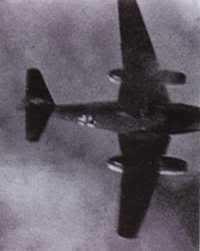 Then came Mr Manfred Boehme in 1992 with “JG 7”, Schiffer Ed. who told us that W.Nr.110813 was produced in December 44, after Kdo. Nowotny was disbanded on 19th November 44… So we can concluded that the above film shows airplanes from III./EJG2 and not from Kdo. Nowotny as usually stated. Finally came Mr Axel Urbanke in 1998 with his marvellous “Green Hearts First In Combat With The Dora 9” who was the first definitely showing an airplane from Kdo. Nowotwy which was “white 2” W.Nr. 110389. Her previous yellow fuselage band, from EKdo 262, is clearly over-painted, the camouflage is a very dark one, and there is a white painted quarter on the rudders lower-rear part.  So since 1998, it became easy to suppose that photos from F. Schall “white 1”, Schreiders “white3” W.Nr.110372 and Helmut Baudach “white or yellow 6 or 8” were all 3 showing airplanes under Kdo. Nowotny markings. 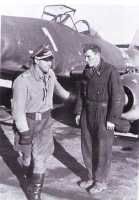  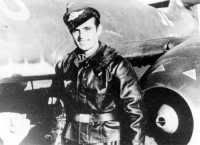 Smith & Creek in Me 262 volume2 from Classic Pub. and Dan O’Connell in is recent book “Messerschmitt Me 262 – The Production Log 1941-1945” ended the story explaining that the “snake” tail fins were actually wooden experimental fins, for what I understand produced in December 44, sometimes retrofitted over earlier Me 262 this explaining why some airplanes produced before Kdo. Nowotny was disbanded could be seen with this "snake" tailplane in December44 or later, as the very known W.Nr.170003 V7 pictured in color. Finally to conclude have a look on this one W.Nr.110371, which except from the missing white or yellow front nose fuselage digits show all the characteristics from a Kdo. Nowotny Me 262: a pretty dark camo without any yellow fuselage band nor any “snake” pattern camo on the tail fin but with a white quarter on the rear and bottom part from the rudder. Note that this white painted quarter is more specific from late 1944 Me 262 production than from Kdo. Nowotny. 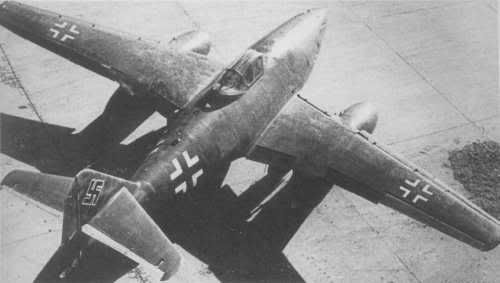 And to this last one 110522 with the yellow fuselage band added after it’s transfer to III./EJG2, pictured in colour inside “Messerschmitt Me 262 – Development-Testing-Production” book from W.Radinger & W.Schick, 1993. The info that it was an airplane transferred from Kdo. Nowotny come from Dan O’Connell book.  Cheers, Olivier Menu. Note: I know authors dislike when photos are published on the web, that’s why, except one, I made them very small (200 pixels wide and 5ko size). Note also that all of them had been already published at least for two times before. Anyway if asked I will delete them. Last edited by O.Menu; 25th May 2006 at 21:56. |
|
#2
|
|||
|
|||
|
Re: Kdo. Nowotny markings : STOP THE MYTH !
Oliver, thank you. I am blue in the face trying to stop this myth. All of those tails were experimental wooden tails, which worked very well, and applied to random aircraft. A VERY few aircraft with them did in fact serve with Nowotny, strictly coincidence.
|
|
#3
|
||||
|
||||
|
Re: Kdo. Nowotny markings : STOP THE MYTH !
So production from those wooden tails would began earlier than December44? Dan, are you able to tell exactly when?
And which were the 100% sure few exceptions to the above rules about Kdo Nowotny aircrafts? I have not yet checked every early W.Nr. from your book but the two times i have look about one with this special tail it was said that she got it after some repairs... |
|
#4
|
||||
|
||||
|
Re: Kdo. Nowotny markings : STOP THE MYTH !
Oliver,
Thanks for this interesting summary. One note regarding the "white painted" lower part of the tail rudder. This was acutally not paint but clear glass and the tail nav light was behind this clear glass part. If I remember correctly the had problems with moisture and from a certain production block onwards installed the external nav light seen on later production Me 262. I might even have some information after which WkNr the new nav light was installed, which may help to identify early and late war Me 262 (if the tail rudder had not been replaced, of course). So, the fact that Kdo Nowotny had mainly Me 262 with this "white" part only means that they were early production Me 262. Kind regards, Roger Gaemperle |
|
#5
|
||||
|
||||
|
Re: Kdo. Nowotny markings : STOP THE MYTH !
Oliver,
The first document I have that mentions the wodden tails is dated 18 September 1944 and mentions that serial production has already started at the company JSF in Darmstadt (JSF is a 3 letter code for a company). Construction drawings had beed presented to Stabü and Forschan Oberammergau as early as beginning of July 1944. Hope that helped. Kind regards, Roger Gaemperle |
|
#6
|
||||
|
||||
|
Re: Kdo. Nowotny markings : STOP THE MYTH !
I am only able to find four Me 262 with known W.Nr. and the "snake" pattern tain fin. From the must have Dan O'Connell book it seems that they all four got some repairs which can explain their new fin camouflage:
- 170047 "white 1+s": experimented 2 or 3 crashes before being pictured on the III./EJG2 film probably in January 1945. - 170061 "white 4": had been pictured with a non "snake" pattern when she was "white 11" under EKdo 262. - 170303 "V 303": pictured, probably early 45, at a time he had the tail fin from another plane, 170078. But when did 170078 got it's "snake" fin, i dont know? - 110376 "white 7": pictured with the "snake" tail after the end of the war. She got one month repair between 10th of December and 9th of January 45 waiting for engines. |
|
#7
|
||||
|
||||
|
Re: Kdo. Nowotny markings : STOP THE MYTH !
If "jsf" is the Lw code for the company working on Me 262 tails, it describes "Pollmann, Franz, Moebelfabrik, Steinheim i/Westf." And, what better than a furniture company to make wooden parts for an aircraft.
|
|
#8
|
||||
|
||||
|
Re: Kdo. Nowotny markings : STOP THE MYTH !
So have we established that there was no camouflage scheme common to all Kdo. Nowotny aircraft?
|
|
#9
|
||||
|
||||
|
Re: Kdo. Nowotny markings : STOP THE MYTH !
Hi Nick, it's pretty sure that there was different camouflages since the airplanes came from different factories.
What is pretty sure also is that none of them got any yellow fuselage band and that the famous wooden tail fin with "snake" camouflage was not the rule but the exception if not absent. I just found a good picture from one of this wooden tail fin and rudder, and strangely there is not any navigation light visible. Could this be the explanation to why it was mostly, if not only, delivered to training or experimental units but not to combat units, last few weeks of war excepted? |
|
#10
|
||||
|
||||
|
Re: Kdo. Nowotny markings : STOP THE MYTH !
Me 262 Rudder Evolution:
Except prototypes, three kinds of rudders are found. - The earlier type got the navigation light enclosed inside a transparent cap. Probably because of its light catching properties it usually appear more white than clear on photos. 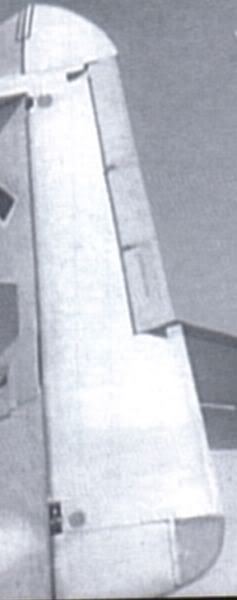 … … - The late type got the navigation light fixed on the bottom rudder tips, which was the usual emplacement on German fighters.  - The intermediate and experimental wooden fin which seems to have the navigation light fixed under the rudder as visible here from shots from “white7” 110376, left side only, “white 1+S” possibly 170047, left & right and “9K+FH” 111685, left & right. I guess this last one got a change from its rudder only, not the fin, and that its “snake” pattern was then over-painted which could be the explanation for its unusual black rudder. Actually I m not able to see any ampoule, only its supposed emplacement which I first thought to be some damage. 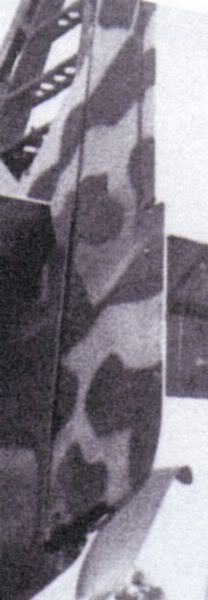 … …  … …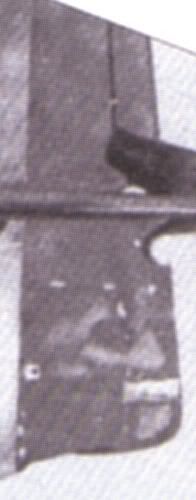  NOTE: I would be pleased for any help about navigation light on the wooden tail-plane. Sources: Photo1 > French mag, “Ciel de Guerre” No.04, 2005. Photo2 > widely published (Me 262 towing a gliding bomb) Photo3 > Burindo “Famous Airplanes of the World” No.115. Photo4 > Luftwaffe Warbirds Photo Album Vol.3, Delta Pub., 1993. Photo5 > French mag, “Aéro Journal” N°1, 1998. Photo6 > French mag, “Aéro Journal” N°1, 1998. Photo7 > French mag, “Le Fanatique de l’Aviation” Hors Serie N°28H, 2005. Photo8 > Luftwaffe Warbirds Photo Album Vol.1, Delta Pub., 1992. Last edited by O.Menu; 28th May 2006 at 19:22. |
 |
| Thread Tools | |
| Display Modes | |
|
|